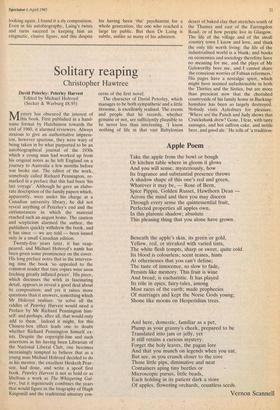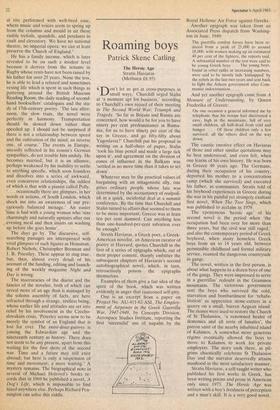Solitary reaping
Christopher Hawtree
David Peterley: Peterley Harvest Edited by Michael Holroyd (Secker & Warburg £8.95)
Mystery has obscured the interest of this book. First published in a hand- some format by Hutchinson towards the end of 1960, it alarmed reviewers. Always anxious to give an authoritative impress- ion, however spurious, they were wary of being taken in by what purported to be an autobiographical journal of the 1930s which a young man had worked up from his original notes as he left England on a journey to Australia a few months before war broke out. The editor of the work, somebody called Richard Pennington, re- marked in a preface that this had been 'his last voyage'. Although he gave an elabo- rate description of the family papers which, apparently, were under his charge at a Canadian university library, he did not reveal anything of Peterley's end and the circumstances in which the material reached such an august home. The caution and scepticism alarmed the author, the publishers quickly withdrew the book, and it has since — we are told — been issued only in a small Canadian edition.
Twenty-five years later, it has reap- peared, and Michael Holroyd's name has been given some prominence on the cover. His long preface notes that in the interven- ing time the book `so appealed to the common reader that rare copies were soon fetching greatly inflated.prices'. His piece, which discusses the work in fascinating detail, appears to reveal a good deal about its composition; and yet it raises more questions than it answers, something which Mr Holroyd realises: `to solve all the riddles of Peterley Harvest would need a Preface by Mr Richard Pennington him- self: and perhaps, after all, that would only add to them.' Indeed it might, for this Chinese-box effect- leads one to doubt whether Richard Pennington himself ex- ists. Despite the copyright-line and such assertions as his having been Librarian of the National Liberal Club, one becomes increasingly tempted to believe that as a young man Michael Holroyd decided to do as his mentor, the excellent Hesketh Pear- son, had done, and write a spoof first book. Peterley Harvest is not as bold or as libellous a work as The Whispering Gal- lery, but it ingeniously combines the years that would figure in the biography of Hugh Kingsmill and the traditional amatory con-
cerns of the first novel.
The character of David Peterley, which manages to be both sympathetic and a little tiresome, is excellently realised. The events and people that he records, whether genuine or not, are sufficiently plausible to be never less than interesting. 'I know nothing of life in that vast Babylonian desert of baked clay that stretches south of the Thames and east of the Farringdon Road; or of how people live in Glasgow. The life of the village and of the small country town I know and love, and think the only life worth living: the life of the industrialised world is a blank; and books on economics and sociology therefore have no meaning for me, and the plays of Mr Galsworthy bore me, and.I cannot share the conscious worries of Fabian reformers.' His pages have a nostalgic spirit, which might have seemed unfashionable in both the Thirties and the Sixties, but are more than prescient now that the cherished countryside of his family home in Bucking- hamshire has been so largely destroyed. Nobody visits Aylesbury for pleasure. 'Where are the Punch and Judy shows that Cruickshank drew? Gone, I fear, with tasty sausages, and hot saffron cake, and nettle beer, and good ale.' He tells of 'a tradition- at rite performed with well-bred ease, where music and voices seem to spring up from the columns and mould in air these visible trefoils, spandrils, and pendants in vault and clerestory. We have no national theatre, no imperial opera: we can at least preserve the Church of England.'
He has a family income, which is later revealed to be on such a modest level because it derives from the tenants in Rugby whose rents have not been raised by his father for over 25 years. None the less, he is able to lead a relaxed and sometimes vexing life which is spent in such things as pottering around the • British Museum Reading Room, the daily reading of second- hand booksellers' catalogues and the stu- dy of 17th-century poetry. 'The late after- noon, the slow train, the novel were perfectly in harmony. Transportation should be slowed down rather than speeded up. I should not be surprised if there is not a relationship between speed and the cultivation of the mind; an inverse one, of course.' The events in Europe, uneasily reflected in his cousin's German sympathies, do not trouble him unduly. He becomes married, but it is an alliance, perhaps weakened by his inability to settle to anything specific, which soon founders and dissolves into a series of awkward, even concurrent relationships, the oddest of which is that with a pianist called Polly.
. . occasionally there are glimpses, in her words or actions, of South London, which shock me into an awareness of our pre- cariously balanced menage.' An easier time is had with a young woman who 'sins charmingly and naturally upstairs after our ,,evening meal and then insists on washing up before she goes home'.
The days go by. The discursive, self- searching passages are interspersed with vivid glimpses of such figures as Housman, Robert Nichols, Christopher Brennan and J. B. Priestley. These appear to ring true, but, then, almost every detail of his account of the funding, editing and launch- ing of the weekly magazine Night and Day is wrong, The inaccuracies of the diarist and the fancies of the novelist, both of which can reveal more of an age than is managed by the solemn assembly of facts, are here refracted through a strange, restless being, whose earlier life and attitudes are set into relief by his involvement in the Czecho- slovakian crisis. 'Peterley seems now to be merely the symbol of an England that is lost for ever. The entre-deux-guerres is joining the Edwardian age and the nineteenth century as history. There does not seem to be any present, apart from this waiting for the first shots of the second war. Time and a future may still exist abroad; but here is only a suspension of time and movement; a mere waiting.' A mystery remains. The biographical note in several of Michael Holroyd's books re- cords that in 1969 he published a novel, A Dog's Life, which is impossible to find listed anywhere else. Perhaps Richard Pen- nington can solve this riddle.











































 Previous page
Previous page